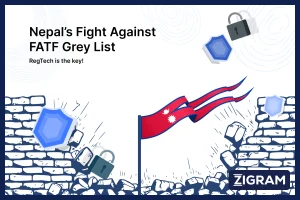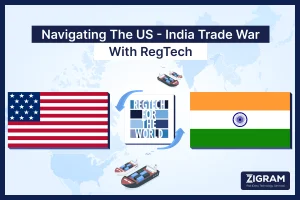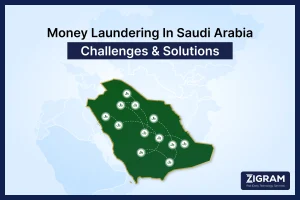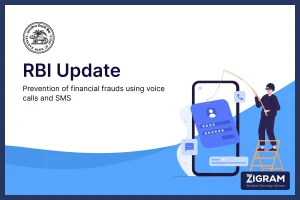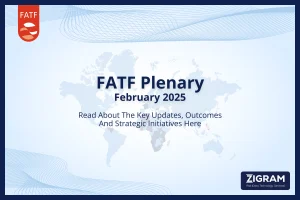The U.S. Department of the Treasury’s Office of Foreign Assets Control (OFAC) plays a critical role in enforcing sanctions that support U.S. foreign policy and national security. For banks, fintech firms, and other financial institutions, one of the most significant but sometimes misunderstood regulations is OFAC’s 50 Percent Rule. This regulation extends the reach of sanctions beyond explicitly named Specially Designated Nationals (SDNs), making it vital for financial institutions to ensure compliance and avoid unintended violations.

Navigating OFAC’s 50 Percent Rule is particularly challenging for firms managing high transaction volumes and complex ownership structures. ZIGRAM’s suite of RegTech solutions, including PreScreening.io, helps financial institutions, fintech companies, and payment processors meet these compliance demands. By automating name screening and ownership verification, ZIGRAM ensures that businesses efficiently identify entities connected to SDNs, preventing prohibited transactions.
PreScreening.io is designed to offer real-time monitoring combined with ZIGRAM’s extensive global data coverage. This allows firms to identify complex, indirect ownership structures, helping them avoid accidental dealings with sanctioned entities. In automating key processes, ZIGRAM enables organizations to streamline AML compliance and remain fully aligned with regulatory requirements.
What Is OFAC's 50 Percent Rule?
The 50 Percent Rule is a cornerstone of OFAC regulations. It applies when an entity is owned 50 percent or more—either directly or indirectly—by one or more individuals or entities listed as Specially Designated Nationals (SDNs). Even if the entity is not named explicitly on the SDN List, it is still subject to the same sanctions as the SDNs that own it. This regulation is broad and can apply even in cases where multiple SDNs own fractional percentages that add up to 50 percent.
For example, if two SDNs each own 25 percent of an entity, that combined ownership triggers the rule, subjecting the entity to the same sanctions. The rule also applies to indirect ownership, meaning SDNs controlling an entity through multiple layers of intermediate companies are still covered. This wide-reaching principle prevents sanctioned individuals from evading restrictions by obscuring their control through complex corporate structures.
Get OFAC updates in a single click! Follow us on LinkedIn now!
Key Points
- Applies when one or more SDNs collectively own 50 percent or more of an entity.
- Ownership interests of multiple SDNs are aggregated to meet the 50 percent threshold.
- Extends to indirect ownership through intermediary entities or corporate layers.
This rule effectively broadens the reach of U.S. sanctions by ensuring that entities controlled by sanctioned parties are also subject to restrictions, even if they are not explicitly named in sanctions lists.
Want to get more knowledge about compliance with OFAC’s standards? Contact us now!
Who Are Specially Designated Nationals (SDNs)?
SDNs are individuals or entities designated by OFAC for their involvement in disreputable activities such as terrorism, narcotics trafficking, or the proliferation of weapons of mass destruction. These individuals and entities are listed on the SDN List, a critical resource for businesses to screen their counterparties.
Key Aspects of the SDN List
- Prohibited Transactions: U.S. persons are prohibited from engaging with SDNs.
- Global Impact: Non-U.S. persons can face secondary sanctions for dealing with SDNs.
- Continuous Updates: The SDN List is frequently updated, making regular sanctions screening essential.
Common Violations Of The 50 Percent Rule
Many organizations inadvertently violate the 50 Percent Rule due to insufficient screening. Here are common ways firms might unknowingly breach the regulation:
Ownership by Multiple SDNs
Conducting transactions with entities owned 50 percent or more by one or more SDNs directly violates the 50 Percent Rule.
SDN-Controlled Entities
Entities controlled by SDNs, even without majority ownership, pose significant risks. OFAC warns that while such entities are not automatically blocked, they could be added to the SDN List in the future. The rise of complex ownership structures, including fractional shares designed to obscure ownership, necessitates diligent vendor due diligence to avoid violating the rule.
Under 50 Percent Ownership
Entities owned 49 percent or even 40 percent by SDNs may not trigger the 50 Percent Rule, but OFAC urges caution. Entities with significant SDN ownership could become the subject of future sanctions or enforcement actions. This underscores the importance of careful risk assessment, as blocked persons often structure ownership to evade the 50 Percent Rule.
Russian-Based Entities
Conducting business with Russian entities, especially following Russia’s 2022 invasion of Ukraine, increases the risk of violating OFAC sanctions. The U.S. Treasury has intensified sanctions against Russian oligarchs, companies, and government officials. Not all sanctioned Russian entities are on the SDN List, complicating compliance efforts. Financial institutions must be cautious about the technology services they procure, as OFAC’s Cyber-Related Sanctions Program includes the 50 Percent Rule, making even minor interactions with sanctioned entities a potential violation.
Majority-Owned By Sanctioned Government
Businesses must avoid entities majority-owned by sanctioned governments.
Inadequate Screening And Due Diligence
Failure to thoroughly screen entities for ownership and control by SDNs can result in violations. Businesses must ensure their screening processes are robust, continuously updated, and capable of identifying complex ownership structures. Inadequate due diligence and reliance on outdated or incomplete information are common factors in OFAC enforcement actions.
What Are The Consequences For Non-Compliance With The 50 Percent Rule?
Non-compliance with the OFAC’s 50 Percent Rule is viewed as a significant threat to U.S. national security and foreign relations. In the first half of 2023 alone, OFAC imposed over USD 556.5 million in fines on companies for violating sanctions. Beyond financial penalties, organizations that fail to comply with the 50 Percent Rule may face a range of other severe consequences.
- License Revocation: Regulatory authorities may revoke licenses, disrupting operations.
- Reputational Damage: Public enforcement actions can erode trust and lead to lost business.
- Global Impact: Violations can restrict international transactions and strain partnerships.
- Enhanced Scrutiny: Firms found non-compliant may face heightened regulatory oversight, adding long-term operational burdens.
5 Ways To Ensure Compliance With OFAC’s 50 Percent Rule?
1. Conduct Thorough Due Diligence
Due diligence is the first line of defense in compliance. ZIGRAM’s Entity Hero helps firms track ownership structures, store KYC information, and manage ongoing compliance. Integrated with PreScreening.io, Entity Hero allows businesses to verify counterparties' ownership structures, ensuring full compliance with OFAC’s 50 Percent Rule.
2. Utilize Screening Tools
ZIGRAM’s PreScreening.io is an advanced screening tool that accesses over 2,750+ global watchlists across 250+ jurisdictions, providing real-time information for sanctions checks. Its API integration and configurable rules engine enable financial institutions to tailor screening criteria, ensuring precise compliance.
3. Regularly Update Sanctions Lists
Maintaining current data is vital. ZIGRAM ensures access to the latest updates, enabling firms to re-screen counterparties when sanctions lists change.
4. Implement Strong Internal Controls
Set up internal controls to monitor business relationships, and establish automated alerts for changes in ownership or new sanctions.
5. Consult Legal And Compliance Experts
Engage with legal and compliance professionals to navigate complex ownership structures and ensure full alignment with OFAC regulations.

FAQs
Q1: What happens if I unknowingly violate the 50 Percent Rule?
A1: Violating the 50 Percent Rule, even unknowingly, can lead to significant penalties, including hefty fines and restrictions on future business activities. It is crucial to establish effective compliance programs to avoid such risks.
Q2: Does the 50 Percent Rule apply to Non-U.S. companies?
A2: Yes, the 50 Percent Rule applies to Non-U.S. companies, especially if they do business with U.S. persons or use U.S. financial systems. They could also face additional penalties, known as secondary sanctions.
Q3: How frequently should I screen counterparties against the SDN List?
A3: It is recommended to screen counterparties at the beginning of a relationship and periodically thereafter, particularly following updates to the SDN List.
Q4: Are there exceptions to the 50 Percent Rule?
A4: There are no exceptions to the 50 Percent Rule. Any entity that meets the 50 percent ownership threshold by SDNs is subject to the same sanctions, regardless of the specific circumstances.
Q5: Who can help with compliance under the 50 Percent Rule?
A5: To comply with the 50 Percent Rule, it’s essential to use sanctions screening software that provides both comprehensive sanctions lists and detailed information on organizational ownership structures. An integrated RegTech solution that combines in-house data with advanced, intelligent applications would be highly recommended for effective compliance.
Understanding and adhering to OFAC’s 50 Percent Rule is crucial for avoiding costly penalties and ensuring compliance. Financial institutions, fintech companies, and payment processors must implement robust due diligence, regularly screen counterparties, and stay updated with sanctions lists. ZIGRAM offers the necessary tools, like PreScreening.io and Entity Hero, to streamline these processes, ensuring your business remains compliant with U.S. sanctions laws.
ZIGRAM’s advanced data assets and top-rated RegTech solutions provide the confidence and efficiency you need to navigate complex regulatory landscapes.
Don’t wait—start your compliance journey now with a FREE DEMO of ZIGRAM’s solutions!
- #50PercentRule
- #OFAC
- #Compliance
- #BeneficialOwnership
- #RegTech

